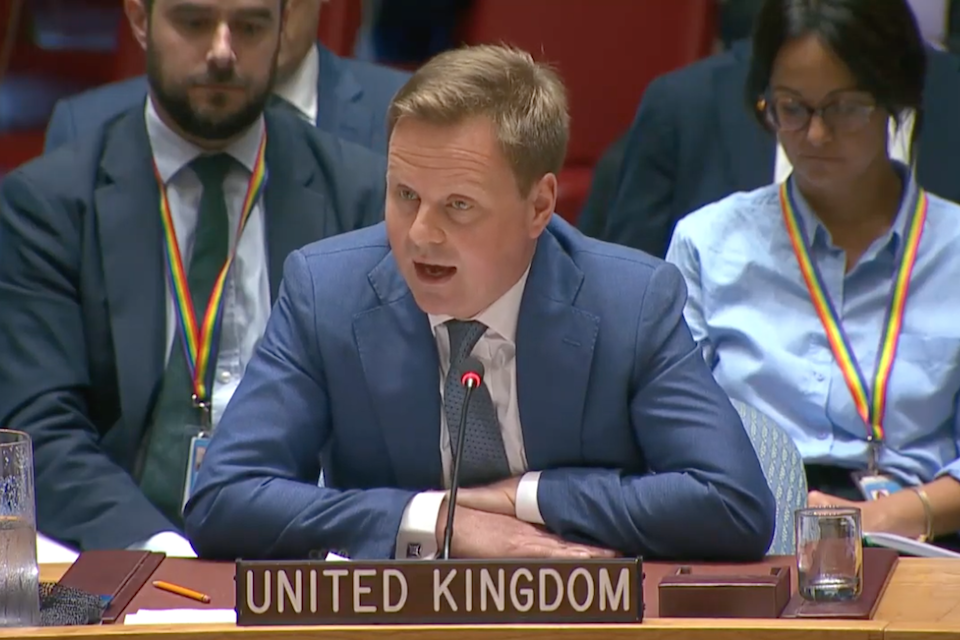
Thank you, Madam President. And thank you to both of our briefers from the UN. The UN continues to have the United Kingdom's full support for the important work that you are doing.
Madam President, since this is my last meeting in this chamber, I wanted to offer a few reflections on the Council's work on Syria. It weighs heavily on me that despite the best efforts of many of us in this chamber, the international community and this council have failed the people of Syria. But we should be in no doubt that the Assad regime bears the primary responsibility for Syrians suffering, as well as Daesh. And we cannot forget Russia's 12 vetoes to protect the Assad regime. Syrians have and continue to endure unspeakable suffering. The regime has bombed them with chemical weapons. It has systematically tortured and murdered the regime's opponents. And it has targeted civilians through mass indiscriminate aerial bombardment. This is still happening this week, as we saw through the horrific images of the violence Marat al-Numan yesterday.
Eight years on from the start of this conflict, we shouldn't forget why it began. In the spring of 2011, ordinary Syrians, among them teachers, students and doctors, took to the streets of Damascus, Daraa, Homs and other towns and cities across Syria to protest peacefully for greater freedom and better governance. I witnessed some of these protests myself. The regime responded with overwhelming force, shooting civilians in the streets, arresting, torturing and murdering them. This is what started the conflict and what sustains it today. And at no point since then has the regime seriously engaged in a political process; it has pursued a ruthless military strategy against its own people to stay in power at any cost.
Madam President, whilst I think it's important to say these things, these words alone will not help the Syrian people today. First, the least we can now do is to put a stop to the violence in Idlib by demanding and implementing an immediate ceasefire. Since the recent escalation, the regime and its allies have killed more than 500 civilians and displaced more than 400,000. Of the 3 million Syrians in Idlib, less than one percent belonged to the terrorist group HTS. There remain more babies than terrorists in Idlib and over half of the population, as my American colleague said, 1.5 million out of 3 million are children. This council must insist on an immediate ceasefire to protect civilians and prevent further war crimes. We therefore strongly support the resolution proposed today by Belgium, Kuwait and Germany.
Madam President, in addition, the least we can do is ensure justice and accountability for the crimes committed by the Assad regime and by Daesh. The United Kingdom will be relentless in our efforts to ensure accountability through our support for the international impartial, independent mechanism, the UN's Commission of Inquiry and through national prosecutions. We welcome the successful prosecutions already underway in Europe and the Secretary-General's decision to establish a board of inquiry. One day, Bashar al-Assad will face justice for his crimes.
We must also keep a laser-like focus on the actions of the military units currently engaged on the ground in Idlib, from the regime, Russia and HTS. These include, but are not limited to, the following: at the Hayma Airbase 679 Squadron, 947 Squadron, 680 Squadron; at the Shayrat Airbase, 677 Squadron, 7 Squadron, 675 Squadron and 685 Squadron; at the Al Nasiriya Airbase, 698 Squadron and 695 Squadron; and at the Tiyas Air Base, 1st Squadron, 819 Squadron, the 5th Squadron of Russia and the 827 Squadron of Russia. We will be watching the actions of these military units and their commanders and we will hold them accountable.
And Madam President, the least we can do is address the root causes of this conflict. As Resolution 2254 recognises in its call for inclusive and non-sectarian governance, there will never be stability and peace in Syria as long as the regime terrorises its people and tortures and murders those who oppose it. Such conditions will continue to act as a breeding ground for extremism and terrorism, such as al-Qaeda and Daesh.
Finally, Madam President, this conflict has undermined and weakened the United Nations and the wider rules based international system. Assad has used chemical weapons against his own people. He has thumbed his nose at this council and our resolutions, at the General Assembly and at the OPCW, aided and protected by Russia and by Iran. If we, as UN member states, are to uphold the ideals of the UN Charter, which sought to save succeeding generations from the scourge of war and which reaffirmed our faith in fundamental human rights and in the dignity and worth of the human person, we must do more to prevent criminal, rogue regimes from violating international law and imposing death and suffering on their people. Respect for state sovereignty can never be a license to allow a leader to commit war crimes against his own people.
Madam President, this council must learn the lessons from the last eight years of this conflict and from the suffering of the Syrian people. We must now come together urgently to stop the violence in Idlib and to protect Syrians from further suffering.
Thank you.






